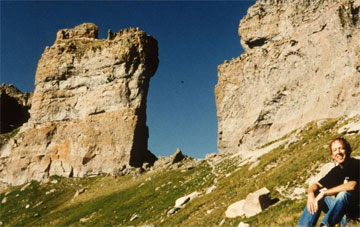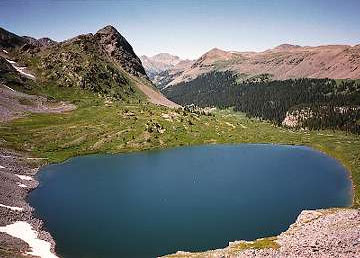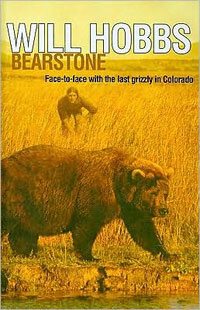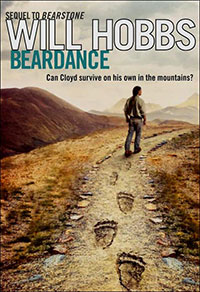 |
A grizzly bear had been killed in the mountains where I go backpacking every summer, the San Juans of Colorado. This happened in 1979, when grizzlies were thought to be extinct in Colorado. I began to think about writing a made-up story about the last grizzly in Colorado. Where did you get the idea for Cloyd, the Native American boy in the group home in Durango? My wife was a teacher and she'd been telling me about a Ute boy she was working with, helping him learn to read. He was about thirteen, and had been sent from Utah to the Native American group home in Durango. She would tell me how homesick he was. My story is fiction, but Cloyd was inspired by her student. I'd been to the Utes' bear dance and knew how significant the kinship between people and bears was to Ute culture. I thought it would be especially meaningful for a Ute boy to meet the last grizzly. (Note that I've written a picture book story, Beardream, about how the people learned the beardance from the bears.) Was Walter, the old man, also inspired by a real person? He was. I used to help an old rancher bring in his hay in the summertime. He'd drive the tractor and I'd throw the bales on the trailer, just like Cloyd does in the story. At lunchtime my friend would tell me about the Pride of the West, his gold mine in the mountains. He had a dream that he would reopen it one day. Given his age, there was little chance it would really happen, but I started to think maybe we could get it done, in a way, in a story. That's how I could get the Ute boy up into the mountains where he would meet that last grizzly. He could help an old rancher reopen his gold mine! For my story, I relocated my friend's mine to a place I knew by heart: the upper Pine River country in the Weminuche Wilderness of southwestern Colorado. Cloyd climbs the Rio Grande Pyramid and rides his horse through the Window. Are those real places?
Definitely. They're both right on the Continental Divide. This photo is of me sitting just below the Window, on one of my backpacking hikes. Bearstone is even more about Cloyd growing up through his relationship with Walter than it is about the grizzly.That's what happens when you start writing a story—the characters become so important. Cloyd and Walter ended up helping each other realize their dreams. I'm really pleased when students and teachers point out that the big themes in Bearstone are found in a saying of Cloyd's grandmother, “Live in a good way,” and in a saying of Walter's, “The hurt you get over makes you stronger.” That's definitely what Bearstone is all about. Beardance, the sequel, is more about the grizzlies, and Cloyd's relationship with the grizzlies. How did the sequel come about? When Bearstone was published, in 1989, a sequel was the farthest thing from my mind. I wouldn't have wanted to make up something about more grizzlies in Colorado when there really weren't any. Then, in 1990, the most amazing thing happened. A rancher on horseback in the southern San Juan Mountains, a man I'd met years earlier, saw not only one grizzly, but four—a mother and three cubs. This sighting was a big item in the newspapers because the rancher was so believable. He'd had a lifetime of experience with black bears, and these bears not only had grizzly coloration, they had humps on their backs, long front claws, and all the rest. In the summers following the sighting, bear biologists tested hair samples and other evidence found in the area, and are trying to determine if these remote mountains of southwestern Colorado may indeed be home to a few surviving grizzlies. Is that how you got the idea of Cloyd meeting the mate and the cubs of the male bear that had been killed in Bearstone? It all seemed to fit. After reading for months, learning all I could about grizzlies and the traditions of native people all across the continent regarding bears, I began work on the novel. During the writing, I hiked back up to the Window, which I saw as the geographic focus of the story. In Bearstone, you never mentioned the legend of the Lost Mine of the Window. Did you make that up, or does the legend really exist? It really exists. In real life, lots of people have searched for it over the years, including treasure exploration companies. (I always keep my eyes open when I'm up there.) Artifacts including primitive gold mills testify that the Spanish really were mining in the San Juans in the 1700s. Walter, the old man, is obsessed with the lost mine. In the first book, he and Cloyd had gone up into the mountains to reopen Walter's gold mine. In the second book, they would go into the mountains to try to find the fabled Spanish treasure. That would put Cloyd in position to encounter the mother griz and her three cubs. Are all the places in Beardance real? Those high lakes, for example?
Every one of them. Lake Mary Alice, for example, is one of my favorite hiking destinations. The first time I visited Mary Alice, at the foot of Mount Oso, I witnessed the colossal water, ice, and rockfall described in Beardance. Do you remember Rock Lake from the story? That's where Cloyd and Ursa were camping when Cloyd left in the middle of the night to free the bear cubs from their cages. That's Rock Lake that you're looking at in the photo on this page. There are hundreds of high lakes like this one in the San Juan Mountains. Once Cloyd is with those cubs, the story gets really intense. What was it like writing Beardance? It was different from any writing experience I'd ever had. I'd already written ten or so chapters when I hiked back up to the Window, but didn't feel very good about them. (They took place, by the way, down on Walter's farm.) Standing in the Window at 12,857 feet I could imagine I saw Cloyd and Walter camping on East Ute Creek far below. I could almost see the entrance to the lost gold mine on the ridge above the creek. And I could imagine Cloyd with the two grizzly cubs, Brownie and Cocoa, as the snow was starting to fall. I practically ran home, my head bursting with ideas for the story. I poured all of my love of the mountains and of bears into the writing, as well as my deep respect for native traditions. What happened to those ten chapters that took place down on the farm? I tossed them away. Now I knew they didn't belong. The sequel should begin with Cloyd and Walter riding into the mountains in pursuit of the treasure. I started over. I found my fingers flying all day and into the night. In writing, as in reading, you're imagining what it's like to be someone else, and I was fully imagining being Cloyd Atcitty, at 11,800 feet with winter coming on, risking his life for those grizzly cubs. I completed an all-new version of the novel in less than a month. It was a wonderful experience, and I don't know if one like it will ever come again. |
|



